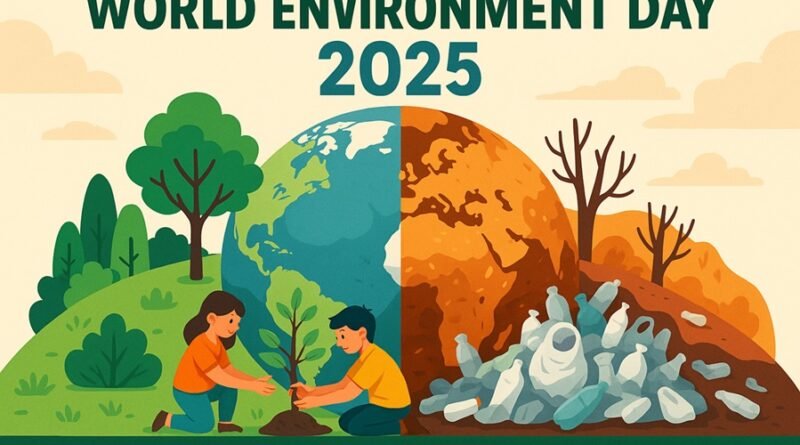2025 Campaign #BeatPlasticPollution: A Global Call to Action for a Plastic-Free Future
Introduction
Plastic pollution is one of the most pressing environmental issues of our time. With over 400 million tonnes of plastic produced globally every year, a significant amount ends up polluting our oceans, rivers, forests, and even our food systems. In response to this crisis, the 2025 Campaign #BeatPlasticPollution emerges as a united global movement to phase out single-use plastics, promote circular economy solutions, and encourage responsible consumer behavior.
Launched under the banner of the United Nations Environment Programme (UNEP), this campaign continues the momentum of World Environment Day 2023 and 2024, aiming to implement long-term policy frameworks, technological innovation, and public engagement by 2025.
Background: The Growing Plastic Crisis
Plastic was once hailed as a miracle material—cheap, versatile, durable. But its indestructibility has become its curse. According to UNEP:
- Only 9% of all plastic ever produced has been recycled.
- Over 11 million tonnes of plastic waste enter the ocean annually.
- Microplastics have been found in human blood, breast milk, and lungs.
The environmental, economic, and health impacts are immense. This has made it imperative to not just reduce plastic use but to transition toward sustainable systems that rethink how we produce, consume, and dispose of plastics.
Objectives of the 2025 #BeatPlasticPollution Campaign
The campaign operates on multiple levels—policy, innovation, awareness, and grassroots action. Its major objectives include:
1. Legislative Reform
- Encouraging countries to implement bans on single-use plastics.
- Enforcing Extended Producer Responsibility (EPR) for plastic manufacturers.
- Supporting the upcoming Global Plastic Treaty being negotiated by over 175 nations.
2. Circular Economy Integration
- Promoting reusable, biodegradable, and recyclable alternatives.
- Supporting plastic waste-to-energy and plastic-to-fuel initiatives.
- Incentivizing product design that minimizes plastic use.
3. Public Awareness & Behavior Change
- Driving mass-scale public education campaigns.
- Promoting initiatives like Plastic-Free Schools, Offices, and Communities.
- Partnering with influencers, artists, and NGOs to spread the message.
4. Corporate Engagement
- Urging companies to redesign packaging and eliminate unnecessary plastic.
- Encouraging businesses to disclose their plastic footprint.
- Recognizing and rewarding eco-innovators and green startups.
Key Highlights and Initiatives of 2025
🌍 Plastic-Free Cities Program
Cities like Amsterdam, Seoul, Nairobi, and Mumbai have joined hands to implement zero-waste strategies, efficient waste collection systems, and promote plastic-free markets.
📱 Digital Platforms and Mobile Apps
The 2025 campaign launched an app named “TrackMyPlastic”, which enables users to track, reduce, and offset their plastic usage, offering incentives for sustainable actions.
🏫 Youth Ambassadors & Education
Schools across 50+ countries are incorporating plastic pollution modules in curricula. Students are acting as eco-ambassadors, organizing cleanliness drives and waste audits.
🧑🔬 Innovation for Impact
Startups are developing biodegradable plastics from algae and banana peels, and using AI and robotics for automated plastic sorting and recycling.
🎥 Creative Campaigns
Viral videos, documentaries like “Plastic Tide 2025”, and campaigns with hashtags like #PlasticDetox and #BreakFreeFromPlastic are shaping conversations online.
Country-Wise Contributions
India
- Banned single-use plastics like straws and cutlery since 2022.
- Major cities like Indore and Bengaluru are leading plastic segregation and recycling.
- Several startups, such as Bakey’s (edible cutlery) and GreenJams (bio-bricks from waste), are gaining international attention.
USA
- States like California, New York, and Oregon have implemented strict plastic bag bans.
- Tech giants like Apple and Amazon are pledging 100% recyclable packaging by 2026.
European Union
- The EU is implementing the Single-Use Plastics Directive, with fines for non-compliance.
- Investment in closed-loop systems and ocean clean-up technologies has accelerated.
Impact So Far
As of mid-2025, the #BeatPlasticPollution campaign reports:
- 320 million people reached through education and awareness drives.
- 1.2 million tonnes of plastic diverted from landfills and oceans.
- Over 800 cities committed to zero-plastic goals.
- 300+ companies pledged to reduce virgin plastic use by at least 50%.
How You Can Contribute
Whether you’re an individual, business, or policymaker, your role is critical:
For Individuals:
- Carry reusable bags, bottles, and containers.
- Avoid microplastics in personal care products.
- Participate in clean-up drives and digital campaigns.
For Businesses:
- Switch to eco-packaging.
- Offer refill stations and incentives for sustainable behavior.
- Conduct a plastic audit of your operations.
For Policymakers:
- Frame and enforce strict plastic regulations.
- Promote research and innovation in sustainable materials.
- Incentivize waste collection and segregation programs.
Looking Ahead: A Plastic-Free Vision
The 2025 campaign is more than a slogan—it is a blueprint for a sustainable future. As the world edges closer to a binding international plastic treaty, the momentum built by the #BeatPlasticPollution initiative is indispensable. It is a reminder that collective action works, and change begins when governments legislate, industries innovate, and individuals commit.
Conclusion
The journey to beat plastic pollution is complex, but it’s not impossible. The 2025 campaign is sowing the seeds for a future where plastic is no longer a threat but a resource managed wisely. Let’s join hands—from classrooms to boardrooms, coastlines to cities—to make our planet plastic-free.
Because the earth doesn’t need more plastic. It needs you.
🔗 Suggested Articles
- World Environment Day 2025: 50+ Wishes, Captions, and Quotes
- Best Speech Writing Ideas for World Environment Day 2025
- Best Essay Writing Ideas for World Environment Day 2025
- World Environment Day 2025: Date, Theme, History, Significance
- Captions for World Environment Day 2025
- Creative Poster Ideas for World Environment Day 2025
- World Environment Day 2025 Quiz: 50+ Questions & Answers

